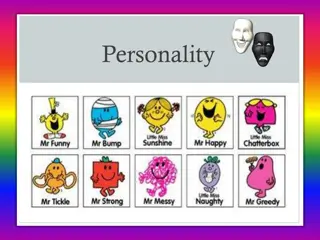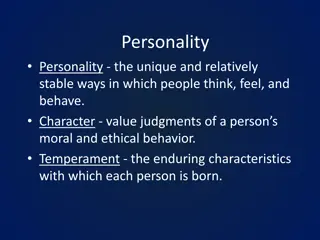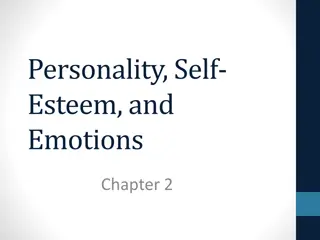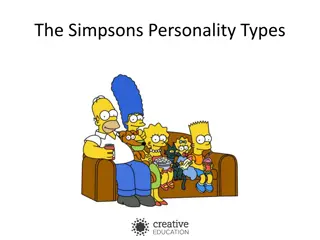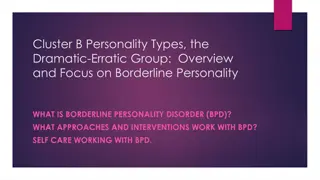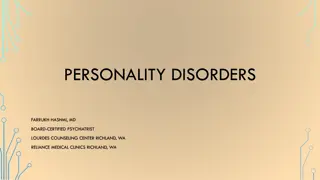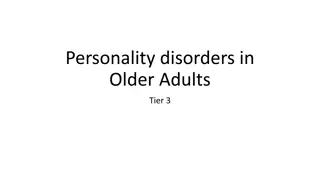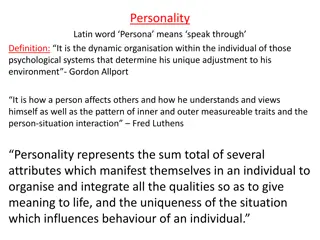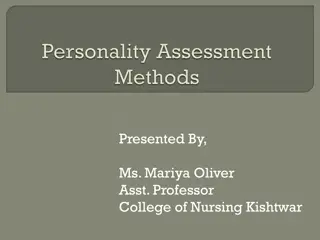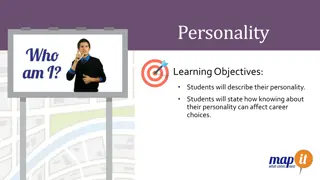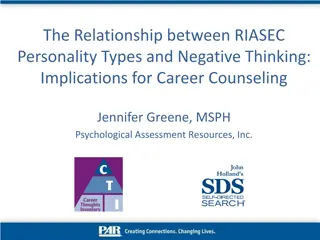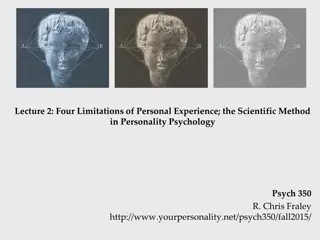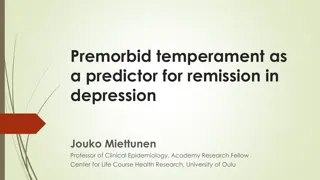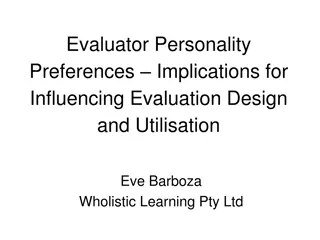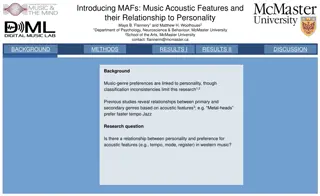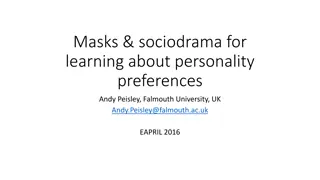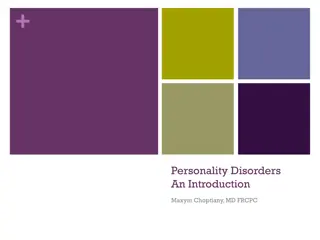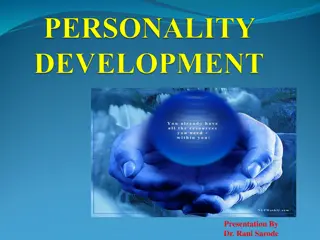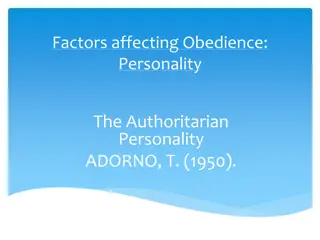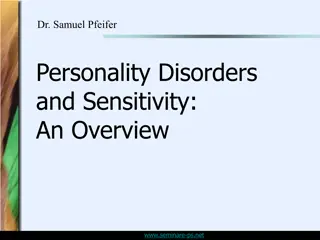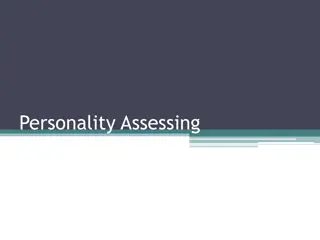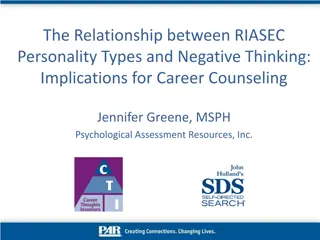Understanding the Enneagram for Intentional Christian Relationships
The Enneagram is a personality system rooted in ancient Christian traditions, now widely used for understanding individual traits and behaviors in modern times. Developed from the concept of nine points representing different personality types, it is a tool to explore vices, virtues, and personal gr
4 views • 10 slides
Understanding Personality: Traits, Characteristics, and Influencing Factors
Personality is the unique combination of physical, mental, and behavioral traits that define an individual. It encompasses characteristics like smartness, dress sense, attitudes, and values. Personality is influenced by biological, environmental, and situational factors, and can be analyzed through
1 views • 49 slides
Understanding Personality: Theories, Types, and Assessment
Exploring the intricate world of personality, this comprehensive guide delves into major theories of personality development, assessment methods, cultural influences, and key contributors. Discover the different types of personalities, including Type A and Type B, and unravel the complexities of psy
1 views • 96 slides
Understanding Individual Personalities and Behaviors in the Workplace
Explore how individual personalities and behaviors impact the modern work experience. Learn about personality traits, character qualities, and personality testing methods like Myers-Briggs and The Big Five. Dive into a class activity comparing introverts and extroverts for various job roles, and dis
1 views • 21 slides
Understanding Personality: Freud's Psychoanalytic Theory
Personality encompasses unique ways individuals think, feel, and behave. Sigmund Freud's psychoanalytic theory explores the divisions of consciousness, parts of personality (Id, Ego, Superego), and stages of personality development. Freud's theory delves into the role of unconscious thoughts, desire
3 views • 41 slides
Understanding Personality: Theories and Components Explained
Personality is the unique and enduring characteristics that define individuals, influencing their behavior consistently over time. Explore the origins of personality from the Latin word 'persona' meaning 'mask', and delve into major perspectives such as psychoanalytic, trait, humanistic, and social-
1 views • 45 slides
Understanding Personality, Self-Esteem, and Emotions in Mental Health
Exploring the dynamics of personality traits such as extroversion, agreeableness, conscientiousness, emotional stability, and openness to experiences, this content delves into the key aspects of personality, self-esteem, and emotions. It discusses the differences between introverts and extroverts, o
0 views • 12 slides
Understanding Personality Traits Through Adjectives
Explore the concept of personality types and traits through positive, negative, and neutral adjectives in this educational material. Learn how to identify and use adjectives related to personality, and understand the significance of different qualities in shaping an individual's unique character.
0 views • 17 slides
Discover Your Simpsons Personality Type Test
Explore your Simpsons personality type by taking a test that involves selecting opposing personality indicators. Based on your choices, you will be matched with a Simpsons character. Learn about different character traits and strengths within the Simpsons universe.
0 views • 12 slides
Understanding Borderline Personality Disorder (BPD) and Cluster B Personality Types
Borderline Personality Disorder (BPD) is part of the Cluster B Personality Types characterized by emotional instability, impulsivity, and strained relationships. Approaches for BPD include dialectical behavior therapy (DBT) and cognitive-behavioral therapy (CBT), while interventions involve emotion
1 views • 24 slides
Understanding Personality Development: Social-Cognitive and Behavioral Perspectives
Social-cognitive theorists view personality development as influenced by the interaction between individual traits and social context, while behavioral theorists focus on learning effects. They relate by emphasizing behavior learning through conditioning and observation, alongside mental processes.
0 views • 19 slides
Understanding Personality Disorders with Dr. Farrukh Hashmi, MD
Dr. Farrukh Hashmi, a board-certified psychiatrist at Lourdes Counseling Center and Reliance Medical Clinics in Richland, WA, specializes in personality disorders. He has no financial relationships with ineligible companies. Gain expert insight and guidance on addressing personality disorders from a
5 views • 35 slides
Understanding Personality Disorders in Older Adults
Personality disorders in older adults can present challenges in social functioning and relationships. Diagnosis involves assessing difficulties in maintaining relationships, controlling behavior, and listening to others. Recent personality changes may not always be due to a personality disorder but
0 views • 14 slides
Understanding Personality Disorders: A Comprehensive Overview and Classification
Dive into the world of personality disorders with this informative presentation by Professor Al-Sughayir. Explore the definition of personality, various types of disorders, traits, terminologies, and etiology. Gain insights into normal versus abnormal traits, functional impairments, and the role of
1 views • 25 slides
Understanding Personality Disorders in Older Adults
Personality disorders in older adults refer to pervasive disturbances in personality and behavior that impact social functioning. Prevalence is around 10% in older community populations, with three main types of disorders categorized by emotional traits. Recent personality changes may indicate under
0 views • 12 slides
Understanding Personality: The Dynamic Organization Within Individuals
Personality, derived from the Latin word "Persona," encompasses the psychological systems shaping an individual's unique adjustment to the environment. It influences how a person interacts with others, perceives themselves, and displays a pattern of inner and outer traits. Personality integrates var
2 views • 10 slides
Understanding Personality Disorders in Older Adults
Personality disorders in older adults can present challenges in living with themselves and others, affecting social functioning and relationships. Prevalence estimates suggest around 10% in older community populations, with males more commonly affected. Different types of personality disorders exist
1 views • 12 slides
Understanding Personality Assessments in Interviews
Personality assessments in interviews are valuable tools for evaluating a candidate's characteristics, abilities, and aspirations. Various types of assessments, such as structured and unstructured interviews, personality inventories like the Minnesota Multiphasic Personality Inventory, the Big Five
2 views • 28 slides
Understanding Personality Traits and Assessments
Psychologists utilize traits to describe personality, addressing common misunderstandings about introversion and exploring the strengths and weaknesses of personality inventories. The consistency of personality traits over time and across situations is examined, along with the identification of insi
1 views • 38 slides
Mastering Objection Handling and Negotiation Strategies: A Comprehensive Meeting Plan
Enhance your team's performance with a 4-week guided meeting plan focusing on objection handling and negotiation strategies. The plan includes pre-learning resources, team challenges, personality type reflection, and practical role-playing exercises. Dive into understanding different personality typ
0 views • 10 slides
Understanding Personality and Its Impact on Career Choices
Explore personality traits, reflect on past experiences, engage in classroom discussions, and take part in online assessments to understand the intricacies of personality and how it influences career decisions. Unveil the key term "Personality" through activities and discussions aimed at self-awaren
1 views • 12 slides
Effective Tips for Personality Development in KHO-KHO: Unlocking Your True Potential
Explore the mechanism for developing the personalities of KHO-KHO coaches and players, understanding the essence of the word "personality," and uncovering key tips for personality development. Discover strategies to improve internal and external traits, such as fitness, appearance, intellect, and la
0 views • 24 slides
The Relationship between RIASEC Personality Types and Negative Thinking: Insights for Career Counseling
Explore the connection between RIASEC personality types and negative career thoughts, utilizing measures like the Self-Directed Search and Career Thoughts Inventory. The study delves into the impact of various personality types on endorsing negative career thoughts, offering implications for effecti
0 views • 24 slides
The Importance of the Scientific Method in Personality Psychology
Understanding personality requires moving beyond personal experiences and subjective beliefs. This lecture emphasizes the limitations of personal experience and the necessity of the scientific method in studying personality. By examining the methods and themes of psychology, we uncover the fundament
0 views • 60 slides
Premorbid Temperament as a Predictor for Remission in Depression Study
Personality traits, specifically premorbid temperament, play a crucial role in predicting remission from depressive disorders. This study, led by Professor Jouko Miettunen, examines how premorbid personality can be a significant factor in assessing the risk and outcome of depressive disorders. By an
0 views • 11 slides
Understanding Evaluator Personality Preferences in Evaluation Practice
Explore how evaluator personality preferences can impact evaluation design and utilization, and how differences in preferences between evaluators and clients may explain controversies in evaluation practice. The interactive session delves into using personality preferences to inform evaluation desig
0 views • 38 slides
Investigating Relationship Between Personality and Music Acoustic Features
This research by Maya B. Flannery and Matthew H. Woolhouse explores the connection between personality and music genre preferences based on acoustic features in Western music. The study involved undergraduate students and analyzed factors like tempo, mode, register, and their impact on individual pr
0 views • 5 slides
Exploring Personality Types and Traits - IPE.MDY.ZONE.2020
Personality types and traits play a significant role in shaping an individual's behavior, thinking patterns, and relationships. This content delves into the primary personality types - Dominance, Inducement, Compliance, and Steadiness - highlighting their characteristics and the Type A and Type B pe
0 views • 28 slides
The Influence of Personality on Presidential Leadership Style: A Case Study of Donald J. Trump
This study examines how personality traits influence presidential leadership styles, focusing on a case study of Donald J. Trump, the 45th President of the United States. It explores the conceptual links between Trump's personality profile and models of political leadership. The research includes a
2 views • 24 slides
Exploring Personality Preferences Through Masks and Sociodrama
Dive into a unique approach of using masks and sociodrama to learn about personality preferences, their impact on interactions, and strategies for managing them. Discover different personality types, reflect on your own learning, and explore ways to apply this approach in practice. While not claimin
0 views • 23 slides
Understanding Brand Personality: A Key Element in Customer Attraction
Every brand, like every individual, has a unique personality that plays a vital role in attracting customers. Defining and embodying this personality is crucial for building customer loyalty and standing out in the market. This tutorial explores the importance of brand personality, guides you in ide
0 views • 5 slides
Understanding Personality Disorders: An Overview
Personality disorders are chronic and maladaptive patterns of thinking, feeling, and behaving that negatively impact interpersonal relationships. Those affected often do not recognize their behaviors as problematic. Differentiating between personality disorders and traits is crucial for diagnosis an
0 views • 97 slides
English for Engineers: Semester 1 Schedule and Personality Traits Analysis
Explore the detailed Semester 1 schedule for the English for Engineers course, including assignments, topics covered, and exams. Delve into the breakdown of personality types and traits related to engineering, identifying key characteristics for success in the field. Discover resources to assess you
0 views • 10 slides
Exploring Personality Development and Traits
Understanding the importance of personality development, this presentation by Dr. Rani Sarode delves into the various aspects that define an individual's character and behavior. It discusses the significance of traits like communication skills, interpersonal relationships, attitude towards life, and
0 views • 24 slides
Understanding Authoritarian Personality and Obedience Factors
Factors influencing obedience, like the Authoritarian Personality theory by Adorno, suggest that early childhood experiences, especially harsh upbringing, can lead to rigid beliefs, high obedience to authority, and discrimination towards perceived lower-status groups. Adorno's research utilized ques
0 views • 6 slides
Understanding Healthy Personality Development
Exploring the concept of a healthy personality and its significance in personal well-being and societal adaptation. The discussion covers different models of mental health, the purpose of personality, and the eight modalities of personal functioning that contribute to overall psychological well-bein
0 views • 32 slides
Understanding Personality Assessment Techniques
Personality assessment techniques include Eysenck's Personality Questionnaire, the Big Five traits theory, psychoanalysis, methods to access the unconscious mind, objective personality tests' advantages and disadvantages, and self-report inventories like the MMPI. Be cautious of the Barnum Effect in
0 views • 18 slides
Understanding Personality: Theories and Perspectives
Personality is a dynamic psychological concept shaped by internal needs, cognitive processes, and external influences. Psychodynamic and humanistic theories offer insights into different aspects of personality, while clinical and social-cognitive perspectives contribute to our understanding. Freud's
0 views • 26 slides
Exploring the Relationship Between RIASEC Personality Types and Negative Career Thoughts
This presentation delves into the correlation between RIASEC personality types and negative career thoughts, with a focus on the implications for career counseling. The research objective, hypotheses, measures used, methods, participants, results, and a case study are discussed in detail. The Self-D
0 views • 24 slides
Understanding Personality and Self-Esteem: Exploring Traits and Mental Health
Exploring personality traits, self-esteem, and mental health through definitions, group activities, and descriptions of extroverts, introverts, optimists, pessimists, and realists. The content covers creating lists of personality traits, identifying assertive behaviors, and outlining objectives rela
0 views • 68 slides


